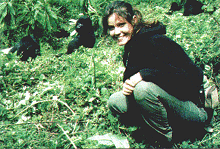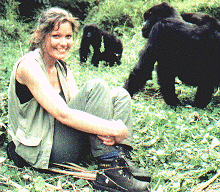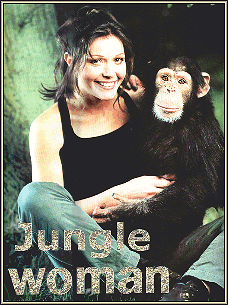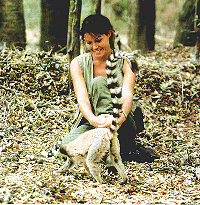|
Zoologist Charlotte Uhlenbroek has been around the world to find that
primates are her best mates.
William Greaves
Being kicked in the small of the back by one mountain gorilla
and then sat on by another is not everyone's idea of a good day at the office.
True to form, as a thoroughly modern adventurer, Charlotte Uhlenbroek remembers
the occasion with undiluted pleasure.
The 32-year-old zoologist with a doctorate in animal communication who hosts
Cousins, BBC 1's three-part documentary on our nearest animal relatives,
had already exchanged a few conversational gorilla clucking noises with the
mighty silverback head of a family of 32 assorted wives and children high
in the Virunga mountains in Rwanda. Indeed, just before she arrived on the
scene a baby gorilla had been born and christened "BBC" in her honour.
But now the patriarch, a descendant of the family encountered
so unforgettably by David Attenborough for Life on Earth more than
20 years ago, had led his group away towards pastures new and only two of
the younger chaps, both nudging 20 stone, were loitering behind the rest
of the tour party. An armed guard accompanied Charlotte and her film crew
in an attempt to keep her and the gorillas safe from the guerrillas who were
still in the area in the aftermath of the civil war that had raged around
their habitat for the past decade.
"As soon as the pair of them saw us they decided to show off
to each other how big and brave they were," she says. "The younger one walked
up, gave me a kick, and looked at his brother as if to say, 'what did you
think of that?'
"So the other one, fully equal to the challenge, came up behind me, started
beating his chest and then just leant forward, knocked me to the ground and
lay on top of me in a great furry heap. I disappeared. It was just like being
bulldozed."
 |
| Dr Charlotte Uhlenbroek meets the monkeys and other primates who are our relatives. |
 |
| Main picture: bonding with young chimp Danny, born at Twycross Zoo, and above, on location in Rwanda having a close encounter with the Gorillas of the Virunga mountains. |
Any conversation with the globetrotting research scientist is liberally peppered with such eclectic anecdotes. There was the time in Japan when she enjoyed a dip in a hot spring with a macaque monkey while its relatives threw snowballs at each other. Thailand found her swinging 100 ft up in the jungle branches to observe gibbons. And she still shudders at the memory of falling 100 ft on to a narrow ledge in Tanzania pursued by a swarm of killer bees, with another 150 ft drop gaping beneath her.
But all she was really doing all this time was fulfilling a
lifestyle that could have been foreseen from birth. After spending her first
five years in Ghana with an English mother and a Dutch father, who was serving
with the United Nations' food and agriculture organisation, she spent the
next ten years in Kathmandu, 4,300ft up in the Himalayan foothills, surrounded
by a menagerie that included rabbits, guinea pigs,
parrots and a string of stray dogs.
After graduating in zoology and psychology from Bristol University,
she stayed in the city to work for the BBC Natural History Unit before leaping
at the chance to spend four years in the Gombe district of Tanzania studying
chimpanzees with renowned expert Jane Goodall - which was to become the basis
of her PhD. while there she contributed two series of Chimpanzee Diary
for BBC2.
"I lived in a hut on the banks of Lake Tanganyika, surrounded by wire to keep the baboons out," she says. "I was constantly entertained by the little ones. As far as they were concerned I was the caged exhibit and they had their noses pressed to the wire to see what I would do next."
Even now, in the relatively unthreatening countryside of Warwickshire, cradling
a four-year-old chimpanzee called Danny with an insatiable appetite for jelly
babies, she still conspires to resemble everyone's image of a jungle woman.
(Although her insistence on chatting outside in the gardens of Twycross Zoo,
near Atherstone, had less to do with a desire to commune with nature than
a "desperate need for a fag".)
And as she hugs her primate pal, her concern for the future
of his fellow creatures in the fast-dwindling forests of their native Africa
quickly changes her humour. "Hunters are killing the females for bushmeat
and selling their children into the pet market. I was shocked to discover
that all the latest estimates suggest that the
chimpanzee maybe extinct in its natural habitat
within the next five years," she explains. "Danny is four years old and was
born at Twycross, although many of the chimps here have been rescued from
illegal traders. They need lots of affection and adore being cuddled, but
they should never be bought as pets, because that is playing into the hands
of their human predators. In the wild, they can
live until they are 50 years old and can become four times stronger than
man - if only they are allowed to do so."
If the global wanderings to chronicle the lemurs, monkeys and
apes that constitute the three parts of Cousins establish her as the
latest inmate of TV wildlife hall of fame, it will be just reward for a life
spent often in isolation, personal danger and out of range of her beloved
chocolate and cheese.
"I've got friends at home and in Africa, but my work with animals in the
bush will always be my main driving force," she says. "And anyway, when I'm
back home in Bristol I keep looking out of the window hoping to see a baboon
out there making faces at me!"
|
Thanks to Sir David Attenborough, the sight of a whispering
anthropologist crouching before a group of jungle primates has passed into
the lexicon of great television moments. Dr Charlotte Uhlenbroek, the rising star of TV natural history series, is seen similarly low-voiced and awe- stricken in front of some hugely powerful beasts. Of course - and no disrespect to Sir David - she probably looks more fetching in a sun top. Charlotte Uhlenbroek has spent five years in the jungles of Gombe, Tanzania, alongside some of our closest living relatives (hence the title of this three-part series) and studying with the renowned scientist Jane Goodall. She is, quite literally on occasion, a woman who paddles her own canoe. |
||
| In Cousins Uhlenbroek's journey takes her around
the world as she observes, among others, red colobus monkeys, doe-eyed bush
babies - whose graceful agility on branches brings to mind Olga Korbut at
the height of her powers - and ring- tailed lemurs, the stars of this week's
programme, who have a remarkable propensity for hanging upside down from
trees, a skill you can't help but feel sorry the human race has lost. And
of course there are the gorillas, who, although huge, move with a kind of
heavy grace it is hard not to admire. Possibly, after all these years of
being observed by whispering TV anthropologists, they have become used to
television cameras, but they do go about their ordered lives apparently
undisturbed by the humans in their midst. To introduce herself, Uhlenbroek
makes a grunting noise, which is good gorilla manners, apparently. It's nice
to think that these colossal beasts have their own etiquette. Alison Graham |
|||

